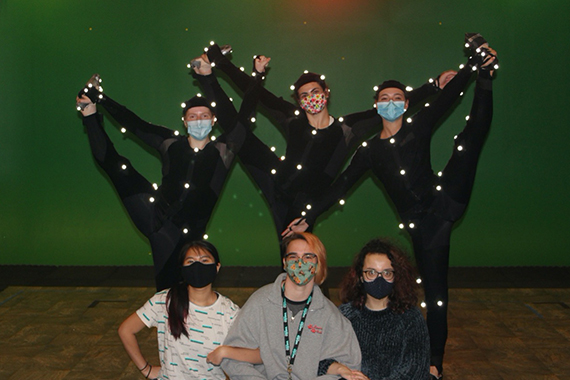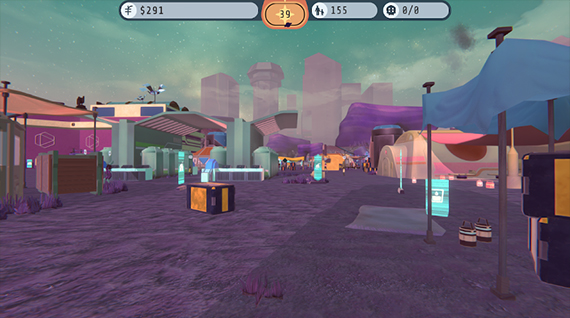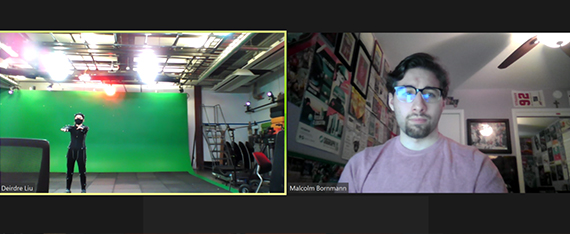Game Design & Production Senior Reflects on 2020 and Shares Hopeful Message with New Dragons
February 16, 2021
Dear New Dragons,
My name is Malcolm Bornmann and I’m a Game Design & Production (GDAP) senior. I wanted to write this letter on behalf of the GDAP program to share with you how Drexel has adapted to the pandemic and what exciting opportunities there are to look forward to in the future.
As a college student who was in your shoes not too long ago, I understand how entering college can be both an exciting and scary time, and I’m sure the hardships of the pandemic have made everything even more challenging. With that, I want you to know that the entire Drexel community is here for you. What I love about Drexel is that Dragons help Dragons—the support network here is amazing!
One aspect of support that has been provided throughout the entire pandemic is accommodations put in place for all students and faculty to help support the learning process. Early in the pandemic, the Drexel GDAP program acknowledged that the human experience has been amplified and will remain so for a while, so it was ever more important that accessibility was considered. For our program specifically, because it’s so dependent on industry-standard software and hardware, our faculty ensured that we had all the tools that we needed. For some classes, this has meant shipping VR equipment to students’ homes across the globe, as well as purchasing software licenses so that students can use them for free. Additionally, all lectures are now recorded for students to reference, and teachers pay close attention to students’ workloads and deadlines, making sure they are fair and manageable for students in all circumstances. Zoom fatigue has also been taken into consideration with classes having short breaks throughout the lecture to allow for everyone to recharge.
In talking with my colleagues, the biggest hurdle for all of us right now has been the feeling of isolation. Luckily, years before the pandemic even started, our GDAP Program Director Rob Lloyd started a Discord server that has become crucial for socialization, conducting playtests, and receiving news about job opportunities, competitions, and scholarships. Our SIGGRAPH Chapter, a student club on campus about all things digital media, has started student-run virtual lab hours where upperclassmen go online for a few hours to offer support to anyone who needs help with assignments. We have many clubs on campus that are still offering a plethora of opportunities to hang out with friends over Zoom, learn something new, and network with industry professionals.

Because education is more accessible and global than ever before, the Drexel GDAP program not only virtually brings in guest speakers from the industry, ranging from Walt Disney Imagineering and Activision to Dreamworks, but we have also been fortunate enough to hire adjunct professors who live on the west coast, now able to teach remotely on the east coast, bringing in even more diverse talent and perspective. Some examples of this include Professor Mindy J. Johnson, award-winning author and historian who focuses on women’s roles in animation and film history; Professor Ian C. Woskey, technical artist with a specialty in character animation for games; and Professor Debra A. Isaac, award-winning visual effects artist who specializes in procedural animation. This, of course, is in addition to our already wonderful Philly-based faculty, including but not limited to, Professor Tony A. Rowe, level designer with shipped titles including Star Wars: The Force Unleashed; Professor Dan A. Rose, environment artist with shipped titles including Shadow of The Colossus (PS4); and Jessica E. Creane, Tony-nominated director who designs immersive, narrative-driven games.
All of the above-mentioned support creates an atmosphere that allows for students to thrive and for the faculty to deliver the robust education that Drexel is known for! Online learning has certainly been an adjustment for all, but in this time, we’ve made team-based games entirely online across various time zones, presented student projects at the first ever virtual SIGGRAPH, and produced innovative experiences that could only come out of a situation like this, such as an hour-long jazz concert created entirely in Unreal. The presentation of our work has had to evolve alongside our changing workflows, like moving our annual Senior Showcase, an event where teams of seniors present their year-long capstone game projects, to an online format. Given the accessible nature of an online format, our 2020 Senior Showcase had the highest attendance yet!

Admittedly, the current job market has negatively impacted the co-op program at Drexel, but one great thing about being a game designer right now, is that the market for our field specifically is very promising with plenty of opportunities to showcase our skills. Thinking about the financial success of Animal Crossing: New Horizons in the beginning of the pandemic, the Among Us craze, the Cyberpunk 2077 drama, or even the recent GameStop rebellion on Wall Street, the gaming community has been a huge part of the pandemic news cycle, further implementing itself in pop culture. As a result of this publicity and the fact that playing games in your home right now is a great way to stay connected, people are playing more games than they used to!
This demand has opened doors at Drexel where Epic Games, for example, has partnered with us to offer remote co-op positions for Drexel students. Meanwhile, internships and entry-level positions can be found at Blizzard Entertainment, Riot Games, and Gearbox Entertainment, all of which employ Drexel Westphal alumni. The Philly indie community is still going strong, as well, with Program Director Rob Lloyd being the Secretary of the Philadelphia chapter of the International Game Developers Association.
Once it is safe to gather in groups again, demand for games may go down and then eventually normalize, but games, or rather interactive and immersive experiences, are not going away. In fact, from a job perspective, Rob Lloyd predicts that our industry will be more accessible than it's ever been, with the ability to work remotely becoming more common. Before the pandemic, there were a few companies such as Spry Fox that did accommodate remote workers and distributed teams, but those companies were more of an exception rather than a rule. COVID-19 has been an accelerant of change, forcing numerous companies to invest time and resources into figuring out how to function remotely. With systems, such as cloud-based development platforms, now put in place for a hybrid working environment, employers and employees are now realizing that it’s more cost efficient in some cases to work remotely. Some companies can now cast a wider net to recruit talent remotely, or at the very least implement a hybrid work environment.
To prepare Drexel GDAP Dragons for this future, Michael Wagner, the Head of Drexel’s Digital Media Department stated, “We are in the process of adapting technologies that support cloud-based development platforms. As part of this, we are also in the process of adapting our curriculum as well as the overall delivery method of our courses.”
Drexel prides itself on always looking ahead, preparing students for the future and to be innovative thinkers in that future. Part of this is incorporating cutting-edge technologies into our education, such as cloud-based computing – which as a side note, I should mention that Drexel GDAP students have access to XR equipment, two motion capture studios, a green screen room that is currently being turned into a virtual production room, filmmaking equipment, computer labs with PC and Mac that have all the software you need, and a theme park ride, all of which we can use to make games on – while another part of this is structuring our education so that we can effectively practice hybrid work.

Wagner continued, “The move to remote learning has pushed us to reevaluate the way we deliver learning content in a face-to face on campus program. While we already had good experience with flipping individual courses (moving lecture content into online format and using face-to-face for design critiques and labs), the recent months have proven that it is also possible to flip entire programs. This has the potential to redefine the education on-campus experience and make college education much more engaging.”
Drexel has been offering online degrees since 1995, so while it certainly was an adjustment to go fully remote during the pandemic, luckily there was already an infrastructure in place that allowed the Drexel Digital Media Department to skip the questions of how to accomplish remote learning and instead focus on how to improve the student remote learning experience. As Dr. Wagner indicated, this has been the focus for this past year, which has yielded primarily successful results. So much so, that moving forward, a permanent feature in Drexel education will be the offering of the Digital Media graduate degree “not only in face-to-face, but also in online, hybrid and low residency formats starting this coming fall.” Dr. Wagner expects this to “be extended into undergraduate programs within the next few years.” How exciting!

As some final thoughts, I wanted to share a few words from Westphal College of Media Arts & Design Dean Jason Schupbach, “Any student of history will tell you that pandemics always change the world, and this one will be no different. The challenges that we have faced this year – the public health and social justice challenges, will change all of our fields. Remote learning has one critical impact on our fields – we crossed the barrier into everyone becoming comfortable with online learning. It’s here to stay, even if it doesn’t work for all kinds of teaching environments. Technologies like Zoom are the ‘1.0’ version, the BlackBerry of online learning – it wasn’t built for education. That said, everyone now knows how to use it and some version of it will show up in all degree programs from now on. I doubt there will ever be a fully just face-to-face program again. It’s like when email was introduced, it didn’t stop all snail mail, but it changed a lot. We’re just beginning to understand those changes. We’ve learned a lot about what works for media, arts, and design teaching using those tools. There were so many great experiments this year, some that worked great, and some that didn’t. We’ll take what worked and continue doing it if it opens up more possibilities for students.”
This is not to say that in-person learning will never happen again—it will always have a place in our society. Rather, this is to say that Drexel’s plan moving forward is to combine the positives of the in-person learning environment with the positives of the remote learning experience to create a more equitable education that allows for flexibility and accommodation for the spectrum of individual learning and its styles and needs. That’s a beautiful thing!
Now, as for digital media specifically, Dean Schupbach states, “I think digital media is in the ‘sweet spot’ post pandemic – we’ve never been in front of screens more... I’m not an expert on the digital media field, but I think everyone can see there is a consolidation happening in media companies and the way we consume media – that will continue to change rapidly in unexpected ways. I hope students can push the edge of these trends and invent the future they deserve. There’s certainly plenty of problems to solve right now, so any digital media project should try to make life better for the world in addition to breaking new ground.”
This idea of “better” that Dean Schupbach mentions is what I find Drexel to be all about. Every step along my educational journey at Drexel, I’ve been supported by my fellow Dragons, which has allowed me to better myself as a young professional and use those skill sets to better our global community. Even during the immense struggle that we’re all in right now, Drexel is still providing that support so all current Dragons, like myself, and all future Dragons, like you, can have a better future and help make a better future.
I wish you all the best!
Malcolm Bornmann, ’21 Game Design & Production